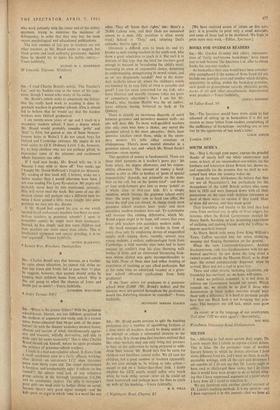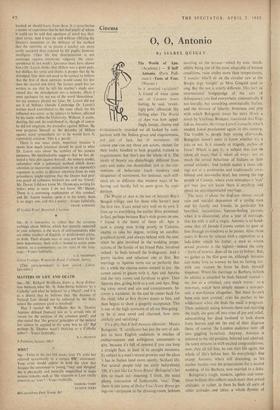MILTON
SIR.—Affecting to feel more sorrow than anger, Dr. Leavis asserts that I labour to repress critical debate. This is false. On the particular issue of modern literary•history to which he directs attention I hold views different from his, and 1 have set them, in easily accessible writings, with all the care and directness I am capable of, I do not say that Dr. Leavis ought to have read or challenged these views; but I do claim that it would have been proper to do so before alleg- ing that I have suppressed argument at a point where I have done all I could to stimulate it. We are favoured with another careful account of Dr. Leavis's teaching methods. It is my opinion—and I have expressed it in this journal—that we have all learned, or should learn, from these. It is nevertheless a matter of experience that he has had 'pupils of whom it could not be said that openness of mind was their chief virtue. And it may be said without vilifying the Doctor's intentions or the delicacy of his method that the opinions of so potent a teacher arc more easily accepted than rejected by hts pupils, however intelligent. (That his fine discrimination is. not sovereign against inveterate vulgarity the corre- spondence in last week's Spectator must have shown him.) Dr. Leavis thinks that Milton was a great poet, but dislikes his verse and thinks it proper that he be dislodged. One does not need to be cynical to believe that the first of these opinions would count for less than the second- and third. l'slo former pupil has yet written to say that he left his teacher's study con- vinced that the dislodgment was a mistake. (Here I must apologise for my use of the word `demolition,' for my memory played me false; Dr. Leavis did not use it of Milton.) Outside Cambridge Dr. Leavis'S written word contributed to the same effect, for his influence was never, as he appears io believe, affected by his status within the University. Without, it seems. desiring this end, he contributed to, though of course he did not originate, the prejudice against Milton. He now proposes himself as the defender of • Milton against more sympathetic (or as he would have It, repressive) criticism. This is.a puzzle.
There is one more point. important because it shows how much attention should be paid to what Dr. Leavis says about the nobility of his present purposes. He unmistakably suggests that he has de- tected a base plot against himself. An unwary reader, unfamiliar with ,a 'polemical method which draws attention to monstrous insinuations in an o'pponent's • arguMent in order to distract attention from its own procedures, 'might suppose that the Doctor had posi-. live proof of collusion between me and my 'friend,' Mr. Dyson. I did not know Mr. Dyson was writing his letter; what is more I do not know Mr. Dyson. There is a sorrowing explanation of this conduct, and Dr. Leavis touches upon it in his letter; there is an angry one, and this I prefer. —Yours faithfully,
18 Syddal Road, Branthall, Cheshire
FRANK K FRNIODF







































 Previous page
Previous page